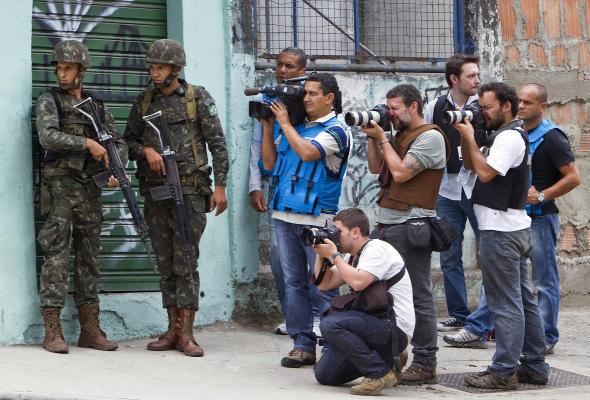Sports commentary is not generally considered one of the more dangerous beats for journalists, but dig a little too deeply into Brazilian soccer and it can be deadly.
On July 5, 2012, Valério Luiz de Oliveira, host of a sports radio program in Goiânia, Brazil, was gunned down outside his station’s offices. Luiz was known for his unsparing criticism of the management of the local soccer team, Atlético Goianiense, and had been banned from the team’s facilities.
The team’s vice president was charged with helping to orchestrate the murder, along with other men. Luiz’s father, also a well-known sports commentator, said he had “lost his son because of football.”
Luiz’s case is highlighted in a recent report from the Committee to Protect Journalists on the culture of violence and impunity that journalists often face in Brazil. The report notes that “Brazil is the 11th-deadliest country in the world for journalists since 1992, ranking one spot worse than war-torn Afghanistan, according to CPJ research.”
According to CPJ, least 10 journalists have been killed as a direct result of their work since President Dilma Rousseff was elected in 2011 and five others were killed under unclear circumstances.
It’s common for these crimes to go unpunished, or for only the triggermen rather than those suspected of orchestrating the attacks to be put on trial. The suspects in Luiz’s murder are currently free awaiting trial. The report does note that a number of convictions in journalists’ murders have been obtained this year, perhaps part of an effort to improve relations with the press in the runup to the World Cup.
In addition to violence, the reports also notes that it’s common for politicians and business to use the country’s privacy laws to stifle unflattering coverage, keeping newspapers and bloggers bogged down in court and on the hook for legal fees and fines.
The report also notes Brazil’s recent efforts to centralize control over the country’s Internet. Though they are an understandable reaction to the NSA spying revelations, there are also concerns that “internet sovereignty” restrictions could lead to more domestic censorships. Brazil already leads the world in Google takedown requests.
Brazil is a large, dynamic country where wealth is often expanding faster than the rule of law. That can make things dangerous for journalists and civil society activists who challenge powerful and wealthy interests. On the other hand, the strength Brazil has over the countries these reports unflatteringly compare it to is that it has a vibrant media and civil society. If nothing else, the World Cup should provide an opportunity to take note of the work they’re doing and risks they are taking.
